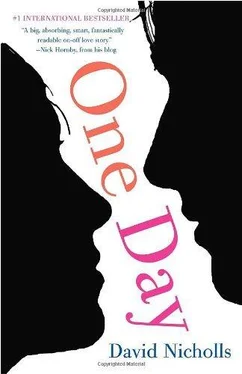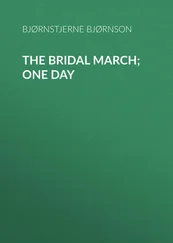David Nicholls - One Day
Здесь есть возможность читать онлайн «David Nicholls - One Day» весь текст электронной книги совершенно бесплатно (целиком полную версию без сокращений). В некоторых случаях можно слушать аудио, скачать через торрент в формате fb2 и присутствует краткое содержание. Жанр: Современная проза, на английском языке. Описание произведения, (предисловие) а так же отзывы посетителей доступны на портале библиотеки ЛибКат.
- Название:One Day
- Автор:
- Жанр:
- Год:неизвестен
- ISBN:нет данных
- Рейтинг книги:4.5 / 5. Голосов: 2
-
Избранное:Добавить в избранное
- Отзывы:
-
Ваша оценка:
- 100
- 1
- 2
- 3
- 4
- 5
One Day: краткое содержание, описание и аннотация
Предлагаем к чтению аннотацию, описание, краткое содержание или предисловие (зависит от того, что написал сам автор книги «One Day»). Если вы не нашли необходимую информацию о книге — напишите в комментариях, мы постараемся отыскать её.
One Day — читать онлайн бесплатно полную книгу (весь текст) целиком
Ниже представлен текст книги, разбитый по страницам. Система сохранения места последней прочитанной страницы, позволяет с удобством читать онлайн бесплатно книгу «One Day», без необходимости каждый раз заново искать на чём Вы остановились. Поставьте закладку, и сможете в любой момент перейти на страницу, на которой закончили чтение.
Интервал:
Закладка:
It is starting to get light. Blackbirds are singing on Coldharbour Lane and he has the sensation, so vivid that it is almost an hallucination, that he is entirely hollow; empty, like an easter egg. Tara the masseuse has created a great twisted knot of tension between his shoulders, the music has stopped, and someone on the bed is asking for tea, and everyone wants tea, tea, tea, so Dexter disentangles himself and crosses to the immense fridge, the same model as his own, sinister and industrial like something you’d find in a genetics lab. He opens the door and stares blankly inside. A salad is rotting in its bag, the plastic swollen and about to burst. His eyes flicker in their sockets, making his vision judder one last time, and coming back into focus he sees a bottle of vodka. Hiding behind the fridge door he drinks a good two inches, washing it down with a sour gulp of apple juice that fizzes repulsively on his tongue. He winces, swallows the liquid down, taking his chewing gum with it. Someone calls for tea again. He finds the milk carton, weighs it in his hand, has an idea.
‘There’s no milk!’ he shouts.
‘Should be,’ shouts Gibbsy or Biggsy.
‘Nope. Empty. I’ll go and get some.’ He puts the full, unopened carton back in the fridge. ‘Back in five minutes. Anyone want anything? Ciggies? Gum?’ There’s no reply from his new friends, so he quietly lets himself out, then tumbles down the stairs and out onto the street, barrelling through the door as if coming up for air then breaking into a run, never to see any of these amazing people ever again.
On Electric Avenue he finds a mini-cab office. On the 15th of July 1993 the sun rises at 05.01 a.m. and already Dexter Mayhew is in hell.
Emma Morley eats well and drinks in moderation. These days she gets eight good hours sleep then wakes promptly of her own accord at just before six-thirty and drinks a large glass of water, the first 250ml of a daily 1.5 litres, which she pours from the brand new carafe and matching glass that stand in a shaft of fresh morning sunlight next to her warm, clean double bed. A carafe. She owns a carafe. She can hardly believe it’s true.
She owns furniture too. At twenty-seven she is too old to live like a student anymore, and she now owns a bed, a large wrought-iron and wickerwork affair bought in the summer sales from a colonial-themed store on the Tottenham Court Road. Branded the ‘Tahiti’ it occupies the whole bedroom of her flat off the Earls Court Road. The duvet is goosedown, the sheets are Egyptian cotton which is, the saleswoman informed her, the very best cotton known to man, and all of this signifies a new era of order, independence and maturity. On Sunday mornings she lounges alone on the Tahiti as if it were a raft, and listens to Porgy and Bess and Mazzy Star, old Tom Waits and a quaintly crackling vinyl album of Bach’s Cello Suites. She drinks pints of coffee and writes little observations and ideas for stories with her best fountain pen on the linen-white pages of expensive notebooks. Sometimes, when it’s going badly, she wonders if what she believes to be a love of the written word is really just a fetish for stationery. The true writer, the born writer, will scribble words on scraps of litter, the back of a bus tickets, on the wall of a cell. Emma is lost on anything less than 120gsm.
But at other times she finds herself writing happily for hours, as if the words had been there all along, content and alone in her one-bedroom flat. Not that she’s lonely, or at least not very often. She goes out four nights a week, and could go out more often if she wanted to. Old friendships are holding up, and there are new ones too, with her fellow students from the Teacher Training College. At the weekend she makes full use of the listing magazines, everything except the clubbing section, which might as well be written in runic script for all its talk of shirts-off-up-for-it crowds. She suspects that she will never, ever dance in her bra in a room full of foam, and that’s fine. Instead she visits independent cinemas and galleries with friends, or sometimes they hire cottages, go for hearty walks in the country and pretend they live there. People tell her she looks better, more confident. She has thrown away the velour scrunchies, the cigarettes, the take-away menus. She owns a cafetiere and for the first time in her life she is considering investing in some pot-pourri.
The clock radio clicks on but she allows herself to lie in bed and listen to the news headlines. John Smith is in conflict with the unions, and she feels torn because she likes John Smith, who seems the right sort, headmasterly and wise. Even his name suggests solid man-of-the-people principles, and she reminds herself once again to look into the possibility of joining the Labour Party; perhaps it will ease her conscience now that her CND membership has lapsed. Not that she doesn’t sympathise with their aims, but demanding multilateral disarmament has started to seem a bit naïve, a bit like demanding universal kindness.
At twenty-seven, Emma wonders if she’s getting old. She used to pride herself on her refusal to see two sides of an argument, but increasingly she accepts that issues are more ambiguous and complicated than she once thought. Certainly she doesn’t understand the next two news items, which concern the Maastricht Treaty and the war in Yugoslavia. Shouldn’t she have an opinion, take a side, boycott something? At least with apartheid you knew where you stood. Now there’s a war in Europe and she has personally done absolutely nothing to stop it. Too busy shopping for furniture. Unsettled, she throws off her new duvet and slides into the tiny corridor of space between the side of the bed and the walls, shuffling sideways to the hall and into the tiny bathroom, which she never has to wait for because she lives alone. She drops her t-shirt into the wicker laundry basket — a great deal of wicker in her life since that fateful summer sale on Tottenham Court Road — puts on her old spectacles and stands naked in front of the mirror, her shoulders pushed back. Could be worse, she thinks and steps into the shower.
She eats breakfast looking out of the window. The flat is six floors up in a red brick mansion block and the view is of an identical red brick mansion block. She doesn’t care for Earls Court particularly; shabby and temporary, it’s like living in London’s spare room. The rent on a single flat is insane too, and she may have to get somewhere cheaper when she gets her first teaching job, but for the moment she loves it here, a long way from Loco Caliente and the gritty social realism of the box room in Clapton. Free of Tilly Killick after six years together, she loves knowing that there’ll be no underwear lurking greyly in the kitchen sink, no teeth marks in the Cheddar.
Because she is no longer ashamed of how she lives, she has even allowed her parents to visit her, Jim and Sue occupying the Tahiti while Emma slept on the sofa. For three fraught days they commented endlessly on London’s ethnic mix and the cost of a cup of tea, and although they didn’t actually express their approval of her new lifestyle at least her mother no longer suggests that she come back to Leeds to work for the Gas Board. ‘Well done, Emmy,’ her father had whispered as she saw them onto the train at King’s Cross, but well done for what? For finally living like a grown-up perhaps.
Of course there’s still no boyfriend, but she doesn’t mind. Occasionally, very occasionally, say at four o’clock in the afternoon on a wet Sunday, she feels panic-stricken and almost breathless with loneliness. Once or twice she has been known to pick up the phone to check that it isn’t broken. Sometimes she thinks how nice it would be to be woken by a call in the night: ‘get in a taxi now’ or ‘I need to see you, we need to talk’. But at the best of times she feels like a character in a Muriel Spark novel — independent, bookish, sharp-minded, secretly romantic. At twenty-seven years old Emma Morley has a double-first in English and History, a new bed, a two-roomed flat in Earls Court, a great many friends, and a post-graduate certificate in education. If the interview goes well today she will have a job teaching English and Drama, subjects that she knows and loves. She is on the brink of a new career as an inspiring teacher and finally, finally, there is some order in her life.
Читать дальшеИнтервал:
Закладка:
Похожие книги на «One Day»
Представляем Вашему вниманию похожие книги на «One Day» списком для выбора. Мы отобрали схожую по названию и смыслу литературу в надежде предоставить читателям больше вариантов отыскать новые, интересные, ещё непрочитанные произведения.
Обсуждение, отзывы о книге «One Day» и просто собственные мнения читателей. Оставьте ваши комментарии, напишите, что Вы думаете о произведении, его смысле или главных героях. Укажите что конкретно понравилось, а что нет, и почему Вы так считаете.












